By: Satya Gopal Dey
Prof. Shantha Sinha, Chairperson of the National Commission for Protection of Child Rights (NCPCR) is known for her pioneering work on the issue of child rights. In recognition of her efforts, she was awarded the Padmashri in 1998 and the Ramon Magsaysay Award for Community Leadership in 2003. She is the founder Secretary Trustee of MV Foundation, a registered Trust based in Andhra Pradesh which has withdrawn over four Lakh of children from work and mainstreamed them into schools. MV Foundation's work in ensuring for rescued child laborers and preparing them for formal schooling into an age-appropriate class has been widely acknowledged and has informed education policies in India and other developing countries. She is a Professor in Political Science, University of Hyderabad. Prof.Sinha recently came to Kolkata to attend a state level consultation as Chief Guest on “Revisiting Child Protection: Diverse Institutional Approaches and Community Based Action”, organised by the ‘Coalition for Child Rights to Protection – West Bengal’ in collaboration with ‘CRY- Child Rights and You’. This exclusive interview with Prof. Shantha Sinha Covered by Satya Gopal Dey on behalf of Imphal Free Press was taken en route from Kolkata Airport to the venue of the Consultation at Rotary Sadan. It is worth sharing that Imphal Free Press for the first time informed the people of Manipur about the visit of NCPCR in 2008.
IFP: Can you give me an overview of implementation Right of the Children for Free and Compulsory education Act in India?
Prof.Sinha: It seems that preparatory work for the implementation of the RTE is being done in most states as for example, mapping out the required number of teachers, construction of classrooms and so on. In some states, trainings have also been conducted for the teachers. In my assessment, the pace has been slow as all the entitlements are to be in place by 2013.
IFP: What role being played by NCPCR as statutory body as per the provision of the Right to Education legislation in particular Context of Manipur and other North Eastern states.
Prof.Sinha: NCPCR has established an RTE division to monitor the implementation of the Act. It has conducted public hearings in 11 states and heard over 2500 cases so far. This includes the state of Manipur as well. It has also conducted Social Audits in 12 states and it includes the state of Assam. Further, it has looked at the implementation of the RTE in the context of children being trafficked from Meghalaya to Tamil Nadu and has held a series of meetings with the government in Meghalaya on the matter.
IFP: NCPCR is authorized to monitor RTEA. What are the key challenges the commission is facing as per as the implementation of the act is concerned? And how the commission is planning to mitigate them?
Prof.Sinha: Absence of a Grievance Redressal Mechanism at the local level and identifying personnel within the department who should be held responsible for violation of each of the entitlements prescribed under the Act makes it difficult for the Commission for a timely follow up and providing for urgent remedies on the complaints it receives. In addition, it feels that planning for Children’s Right to Education on the basis of enrolment statistics (which is pegged at 97 per cent) leaves out children who have dropped out of school, migrant children, child labour, children who are being trafficked and girls. It is so important that all planning is done based on statistics of retention of children in schools. Most teachers and functionaries of the education department are still not serious about this important fundamental right.
IFP: You are the first Chair Person of NCPCR and the members of Child Right organisations are in deed honoured to have you as the Chairperson in your second term. What is the significant action being taken by NCPCR to ensure Child Right? Could you please highlight some of this significant action in particular context of Manipur and other North Eastern states?
Prof.Sinha: In addition to monitoring of RTE, NCPCR has taken up issues of malnutrition, juvenile justice, child labour, rights of children in areas of civil unrest, children affected and infected with HIV and AIDS. In all these issues, it has taken up complaints, has held wide range of consultations and made policy recommendations to the government. In Manipur alone, it held two public hearings focusing on children affected and infected with HIV and AIDS, child trafficking and Right to Education. Teams from NCPCR have visited Manipur to follow up on an important case pending with the Supreme Court regarding trafficking of children. In Assam, it has piloted a programme in Kokrajar and Chirang districts to protect Children’s rights in the context of civil unrest with support from the Prime Minister’s relief fund. In Tripura, the commission has been following up with protection of rights of Reyang tribal children from Mizoram living in relief camps in Tripura. In Meghalaya, it has taken up the issue of child labour in Jaintia hills and has been systematically following up for their rescue, relief and rehabilitation.
IFP: NCPCR formalised a dedicated Cell for North Eastern States – What is their task being designated and how to approach them?
Prof.Sinha: Yes NCPCR formalised a dedicated cell for North Eastern Sates. In view of the fact that there are specific issues of violations on children’s rights in Assam, Meghalaya, Manipur, Tripura, Nagaland, Arunachal Pradesh and Sikkim, it was felt necessary to set up a cell in the commission dedicated for the North-East states. The Cell would go into the details of policies as well as the implementation in these states and maintain contacts with both the civil society as well as the government. The groups may contact the NCPCR’s office for any assistance. The address is in the website.
IFP: Coming again to the context of Manipur, Child Right Vulnerability and the gravity of the same is in deed different in this state. Children are either single or double orphaned due to conflict or HIV AIDS, several other Child Rights vulnerability are there. What is your message to both Central as well as State Government?
Prof.Sinha: As we understand, it is a complex issue requiring a coordinated action from the level of the village up to the central government. Further, it requires coming together of all concerned departments such as health, nutrition, women and child development, social welfare, education and labour. There are also the issue of a porous border with neighbouring countries that makes it even more precarious for children in the districts bordering those nations. Unless, there is a decentralized plan of action and a mechanism to track each and every child in the area to help restore them their childhood, it seems these problems would not be resolved easily.
IFP: State Commission for Protection of Child Rights (SCPCR) has not yet been formed in several states. You have reminded all the Chief Secretaries of the state. What is your opinion on this?
Prof.Sinha: It is so important that all the states in the country establish SCPCRs. We have been writing to the governments impressing upon them the need for the same. The link between protection of child rights and India’s development and democracy has so far not been recognized sufficiently. Unfortunately, protections of children’s rights have not caught the imagination of those in authority and in government.
IFP: Your idea and contribution to eradicate Child Labour is in deed a legend – Please tell us some thing about this.
Prof.Sinha: The MV Foundation with whom I was associated based its work on simple, non-negotiable principles that no child must work or be in labour force and every child shall attend full time formal school; there shall be no distinction between hazardous labour and non-hazardous labour; a child out of school has to be considered as child labour or potential child labour; and finally, there can be no excuse for perpetuating child labour in the country. Based on this, it discovered the enormous demand for education among the poorest of parents in the country and their willingness to sacrifice to enable children to go to schools. It also found that children were employed because they were a source of cheap labour who could be forced to work for long hours without questioning. It was more the employer’s need than the poverty of the parent that compelled children to work.
IFP: What role being played by NCPCR to collaborate with Civil Society Organisation to ensure child Rights. Could you please give us some high lights?
Prof.Sinha: I would like to thank all the civil society organisations in the state of North East, especially in Manipur who have brought issues to the fore on violation of child rights, giving the Commission detailed reports, supporting its public hearings and being the eyes and ears for all its activities.
IFP: What is your special message to the People and Government of Manipur in the context of restoration of Child Rights?
Prof.Sinha: NCPCR recognizes the odds against which both the people and government are located in this particular historical juncture. It must be realized that one has to transcend all political and other differences in support of children and for protection of their rights. On the matter of child rights there can only be consensus. Perhaps by coming together on children’s rights there could be a harmonisation of the society.
Prof. Shantha Sinha, Chairperson of the National Commission for Protection of Child Rights (NCPCR) is known for her pioneering work on the issue of child rights. In recognition of her efforts, she was awarded the Padmashri in 1998 and the Ramon Magsaysay Award for Community Leadership in 2003. She is the founder Secretary Trustee of MV Foundation, a registered Trust based in Andhra Pradesh which has withdrawn over four Lakh of children from work and mainstreamed them into schools. MV Foundation's work in ensuring for rescued child laborers and preparing them for formal schooling into an age-appropriate class has been widely acknowledged and has informed education policies in India and other developing countries. She is a Professor in Political Science, University of Hyderabad. Prof.Sinha recently came to Kolkata to attend a state level consultation as Chief Guest on “Revisiting Child Protection: Diverse Institutional Approaches and Community Based Action”, organised by the ‘Coalition for Child Rights to Protection – West Bengal’ in collaboration with ‘CRY- Child Rights and You’. This exclusive interview with Prof. Shantha Sinha Covered by Satya Gopal Dey on behalf of Imphal Free Press was taken en route from Kolkata Airport to the venue of the Consultation at Rotary Sadan. It is worth sharing that Imphal Free Press for the first time informed the people of Manipur about the visit of NCPCR in 2008.
IFP: Can you give me an overview of implementation Right of the Children for Free and Compulsory education Act in India?
Prof.Sinha: It seems that preparatory work for the implementation of the RTE is being done in most states as for example, mapping out the required number of teachers, construction of classrooms and so on. In some states, trainings have also been conducted for the teachers. In my assessment, the pace has been slow as all the entitlements are to be in place by 2013.
IFP: What role being played by NCPCR as statutory body as per the provision of the Right to Education legislation in particular Context of Manipur and other North Eastern states.
Prof.Sinha: NCPCR has established an RTE division to monitor the implementation of the Act. It has conducted public hearings in 11 states and heard over 2500 cases so far. This includes the state of Manipur as well. It has also conducted Social Audits in 12 states and it includes the state of Assam. Further, it has looked at the implementation of the RTE in the context of children being trafficked from Meghalaya to Tamil Nadu and has held a series of meetings with the government in Meghalaya on the matter.
IFP: NCPCR is authorized to monitor RTEA. What are the key challenges the commission is facing as per as the implementation of the act is concerned? And how the commission is planning to mitigate them?
Prof.Sinha: Absence of a Grievance Redressal Mechanism at the local level and identifying personnel within the department who should be held responsible for violation of each of the entitlements prescribed under the Act makes it difficult for the Commission for a timely follow up and providing for urgent remedies on the complaints it receives. In addition, it feels that planning for Children’s Right to Education on the basis of enrolment statistics (which is pegged at 97 per cent) leaves out children who have dropped out of school, migrant children, child labour, children who are being trafficked and girls. It is so important that all planning is done based on statistics of retention of children in schools. Most teachers and functionaries of the education department are still not serious about this important fundamental right.
IFP: You are the first Chair Person of NCPCR and the members of Child Right organisations are in deed honoured to have you as the Chairperson in your second term. What is the significant action being taken by NCPCR to ensure Child Right? Could you please highlight some of this significant action in particular context of Manipur and other North Eastern states?
Prof.Sinha: In addition to monitoring of RTE, NCPCR has taken up issues of malnutrition, juvenile justice, child labour, rights of children in areas of civil unrest, children affected and infected with HIV and AIDS. In all these issues, it has taken up complaints, has held wide range of consultations and made policy recommendations to the government. In Manipur alone, it held two public hearings focusing on children affected and infected with HIV and AIDS, child trafficking and Right to Education. Teams from NCPCR have visited Manipur to follow up on an important case pending with the Supreme Court regarding trafficking of children. In Assam, it has piloted a programme in Kokrajar and Chirang districts to protect Children’s rights in the context of civil unrest with support from the Prime Minister’s relief fund. In Tripura, the commission has been following up with protection of rights of Reyang tribal children from Mizoram living in relief camps in Tripura. In Meghalaya, it has taken up the issue of child labour in Jaintia hills and has been systematically following up for their rescue, relief and rehabilitation.
IFP: NCPCR formalised a dedicated Cell for North Eastern States – What is their task being designated and how to approach them?
Prof.Sinha: Yes NCPCR formalised a dedicated cell for North Eastern Sates. In view of the fact that there are specific issues of violations on children’s rights in Assam, Meghalaya, Manipur, Tripura, Nagaland, Arunachal Pradesh and Sikkim, it was felt necessary to set up a cell in the commission dedicated for the North-East states. The Cell would go into the details of policies as well as the implementation in these states and maintain contacts with both the civil society as well as the government. The groups may contact the NCPCR’s office for any assistance. The address is in the website.
IFP: Coming again to the context of Manipur, Child Right Vulnerability and the gravity of the same is in deed different in this state. Children are either single or double orphaned due to conflict or HIV AIDS, several other Child Rights vulnerability are there. What is your message to both Central as well as State Government?
Prof.Sinha: As we understand, it is a complex issue requiring a coordinated action from the level of the village up to the central government. Further, it requires coming together of all concerned departments such as health, nutrition, women and child development, social welfare, education and labour. There are also the issue of a porous border with neighbouring countries that makes it even more precarious for children in the districts bordering those nations. Unless, there is a decentralized plan of action and a mechanism to track each and every child in the area to help restore them their childhood, it seems these problems would not be resolved easily.
IFP: State Commission for Protection of Child Rights (SCPCR) has not yet been formed in several states. You have reminded all the Chief Secretaries of the state. What is your opinion on this?
Prof.Sinha: It is so important that all the states in the country establish SCPCRs. We have been writing to the governments impressing upon them the need for the same. The link between protection of child rights and India’s development and democracy has so far not been recognized sufficiently. Unfortunately, protections of children’s rights have not caught the imagination of those in authority and in government.
IFP: Your idea and contribution to eradicate Child Labour is in deed a legend – Please tell us some thing about this.
Prof.Sinha: The MV Foundation with whom I was associated based its work on simple, non-negotiable principles that no child must work or be in labour force and every child shall attend full time formal school; there shall be no distinction between hazardous labour and non-hazardous labour; a child out of school has to be considered as child labour or potential child labour; and finally, there can be no excuse for perpetuating child labour in the country. Based on this, it discovered the enormous demand for education among the poorest of parents in the country and their willingness to sacrifice to enable children to go to schools. It also found that children were employed because they were a source of cheap labour who could be forced to work for long hours without questioning. It was more the employer’s need than the poverty of the parent that compelled children to work.
IFP: What role being played by NCPCR to collaborate with Civil Society Organisation to ensure child Rights. Could you please give us some high lights?
Prof.Sinha: I would like to thank all the civil society organisations in the state of North East, especially in Manipur who have brought issues to the fore on violation of child rights, giving the Commission detailed reports, supporting its public hearings and being the eyes and ears for all its activities.
IFP: What is your special message to the People and Government of Manipur in the context of restoration of Child Rights?
Prof.Sinha: NCPCR recognizes the odds against which both the people and government are located in this particular historical juncture. It must be realized that one has to transcend all political and other differences in support of children and for protection of their rights. On the matter of child rights there can only be consensus. Perhaps by coming together on children’s rights there could be a harmonisation of the society.

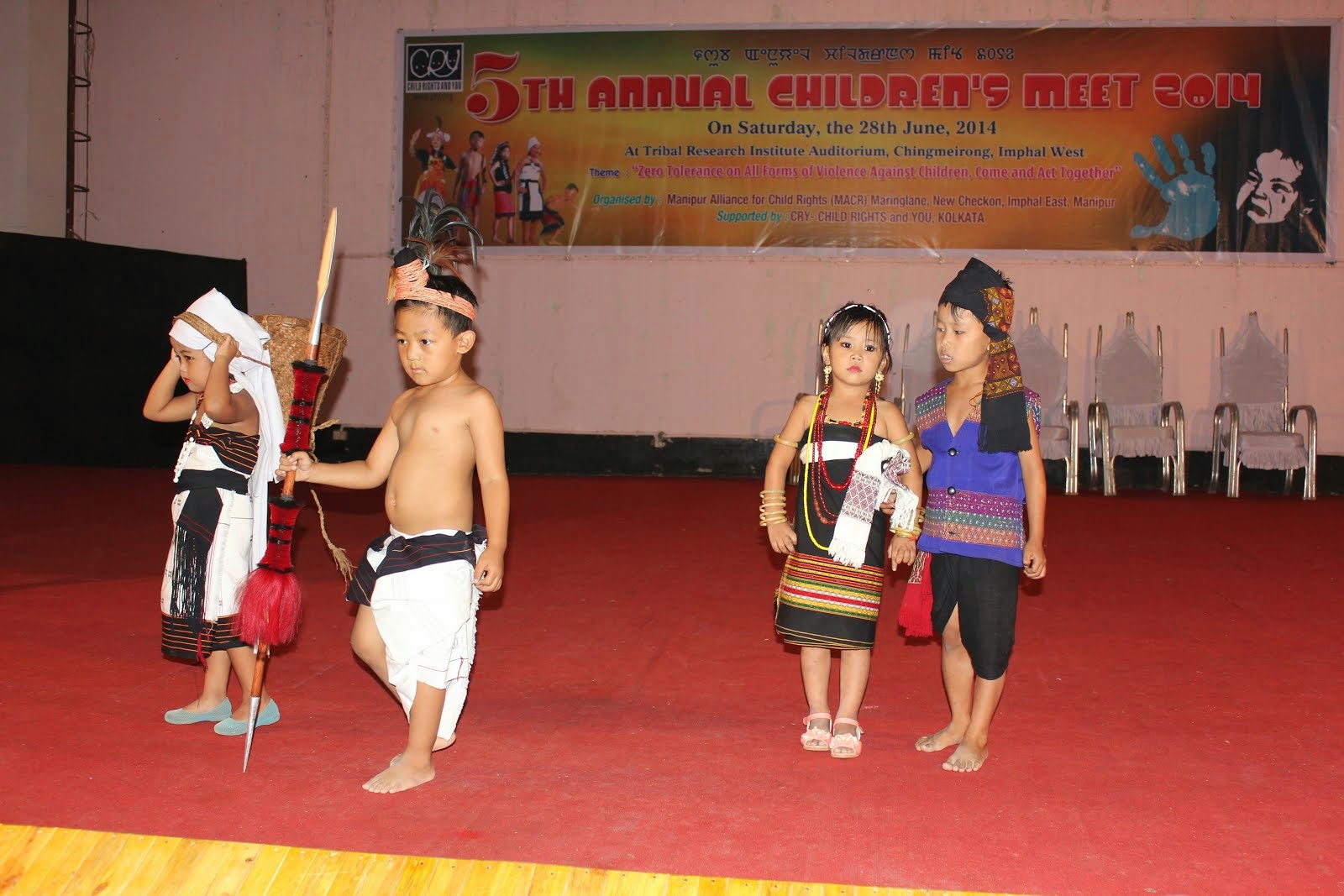

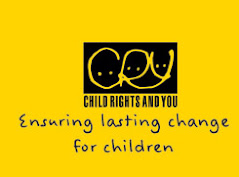





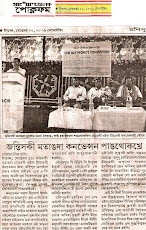
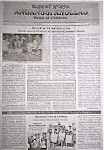
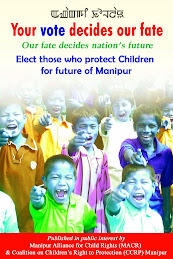





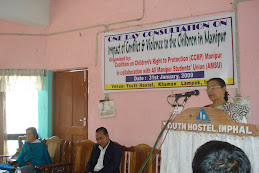
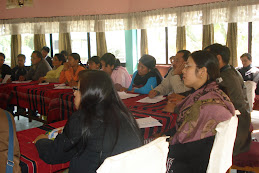
No comments:
Post a Comment